Welcome to our column, Russia Update, where we will be closely following day-to-day developments in Russia, including the Russian government’s foreign and domestic policies.
The previous issue is here, and see also our Russia This Week feature The Kremlin’s Policy-Making on Ukraine is ‘A Mess’; ‘Managed Spring’: How Moscow Parted Easily with the ‘Novorossiya’ Leaders and Putin ‘The Imperialist’ A Runner-Up For Time’s ‘Person of the Year’
The ruble continues to decline in value against the dollar and euro even as falling oil prices remained steady today. Some stores have begun using a term not seen since the 1990s, “conventional units” which is a euphemism for foreign currency.
Please help The Interpreter to continue providing this valuable information service by making a donation towards our costsâ€.
UPDATES BELOW
Novaya Gazeta reports that Yury Shutov, former deputy of the St. Petersburg legislature, has died in a prison colony, citing Fontanka, the St. Petersburg news site.
The Interpreter has a translation:
Yury Shutov died in the Bely Lebed [White Swan] colony, sources told Fontanka.
According to preliminary information, the former deputy, age 68, sentenced to life imprisonment, died this past Saturday [December 13]. The cause is not yet known.
Lawyers representing the interests of Yury Shutov in the European Court of Human Rights refrained from comment.
Reference:
On November 21, 2014, the Russian Supreme Court ruled to keep in force the sentenced given February 17, 2006 by a collegium of judges of the St. Petersburg City Court, according to which Yury Shutov pleaded guilty to organization and leading a gang, organizing six murders, two attempted murders and one kidnapping, one assault and also fraud through the use of official position. He was sentence to life in prison.
The ruble had reached a record low today, 66.59 to a single dollar. Right before the announcement was made the exchange rate was 65.61 rubles per dollar. As of just minutes ago it was 60.09 per dollar.

But here’s something to keep in mind — at the start of the day the ruble was valued at 58.12 to a dollar – meaning that even after this massive interest hike, the ruble is not at the value it was at before the start of the day.
Two Russian human rights lawyers arrested by Grozny police yesterday, December 14, after their office burned down were released, Slon.ru reported, citing a tweet from the Committee Against Torture in Nizhny Novgorod.
The Joint Mobile Group of Human Rights Defenders, lawyers from the
Committee Against Torture and other groups protested the order by
Chechen leader Ramzan Kadyrov to burn down the houses of relatives of
terrorists who died in a gunfight with police December 4. After members
of the terrorist group Caucasus Emirates took over the Press House in
the center of Grozny, police aimed heavy artillery on the building,
causing one civilian to be killed. A total of 18 law-enforcers,
including a relative of Kadyrov’s died in the battle along with 11 militants.
Igor Kalyapin and other human rights activists held a
press conference to condemn Kadyrov’s collective punishment, and
supporters of Kadyrov threw eggs on them. Then they were warned that
their office would be torched, so they evacuated staff before armed
masked men arrived to ask questions about their activities.
Two
remaining staff, lawyers Sergei Babinets and Dmitry Dmitriev left for a
hotel and were tailed by the gunmen. Later they learned their office was
on fire. Both local and federal media denounced the human rights
activists and broadcast on social media and television a false claim by Kadyrov that Kalyapin funded the
terrorists.
The lawyers returned to their office to find all the
equipment damaged and everything scorched. When they called the police
to make a report, they wound up being detained and searched themselves,
and having their laptops and cameras confiscated and their car and
office searched without a warrant. Then they were taken to the police
precinct because one of the law-enforcers said that Babinets was
suspicious because he had a beard.

Babinets
noted on this Facebook page that the security video from the building,
published by Novaya Gazeta, at 9:33 shows three men coming to the Joint
Mobile Group’s office.
He identified them as high-ranking officials in Chechnya; the first man was unknown, the second from the left looks like Kamayev, the prefect for Zavodsky District in Grozny and the third appears to be Abushaykh Vismuradov, the head of the Interior Ministry for Grozny.
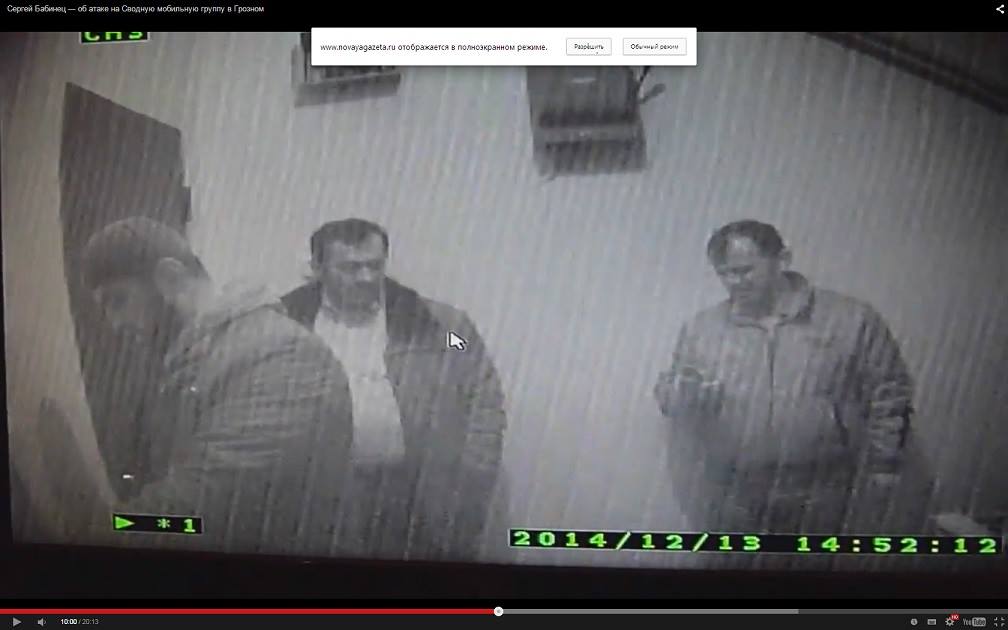
“Why did they come several hours before the fire?” he asks. Kalyapin noted that the man seemed to be taking out a pistol. “Did they really come to complain about torture?” he asked.
Babinets has continued to publish the photos of the destroyed homes of relatives of the terrorists.
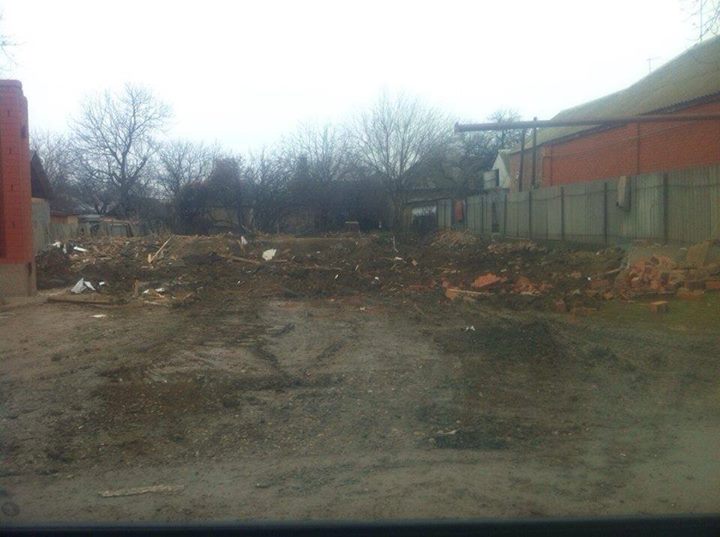
This photo, taken by Novaya Gazeta reporter Yelena Milashina, shows the razed home of an elderly couple and their son and daughter-in-law, who had a sick one-year old baby. They have been left without property, money or identification papers and even warm clothes, and have nowhere to go — the Russian activists attempting to help such people are now themselves in trouble.
But through the help of Svetlana Gannushkina, who runs a Moscow-based organization to help migrants called Civic Action, they were able to get confirmation that the Ukrainian government will accept the family as refugees, and a Norwegian organization will provide assistance. An individual donor also sent them some emergency cash.
It was the 10th such home burned down.
Kalyapin, a lawyer based in Nizhny Novgorod, has about 1700 friends and 500 followers on Facebook, and many have urged him not to go back to Chechnya because it is too dangerous. Some Chechens have also questioned whether peaceful protest is futile, and say they understand why the terrorists took up arms because they feel it is impossible to obtain justice when the system is so abusive and corruption. Some Russians have also questioned why Kalyapin remains in the Presidential Council for Human Rights, when that is a symbol of Putin and the cooptation of the human rights movement.
Kalyapin replied that he was nominated to the Council in order to provide some level of protection when he and his colleagues traveled to Chechnya.
“If I an my colleagues don’t go and speak out, then the rest will find it even more difficult and dangerous.” He said he was relying on the Internet “which has become the chief source of information and communication for the more thinking part of the population.” If the state has control of most of the population through TV, he can reach those on the Internet:
I believe that every person whom I manage to tear away from the 85% and bring to the current 15% is very precious. And all the more the work which we are doing. Besides, you shouldn’t forget that we help concrete people with our work, who suffered from abuse. And odd though it may be, it provides results: look at our site, 109 police officers tried for torture, victims compensated for about 26 imllion rubles, and 633 unlawful actions by investigative agencies reversed. That also means something?”
The terrorist attack and the crackdown on human rights lawyers protesting the ferocity of Kadyrov’s response has put Chechnya back in the news. The New York Times, Foreign Policy and other major media have begun cover the republic again, after a period of relative calm following two wars in the 1990s and high-profile terrorists attacks earlier in this decade.
The last four years have seen only two terrorist attacks with a total of 24 police and 3 civilians killed. Grozny has witnessed a construction boom and a return to peace, but only due to Kadyrov’s ruthless authoritarianism, under which any Muslim believers who are outside official state-sanctioned mosques and any young men who engage in any suspicious activity can be arrested, tortured, imprisoned or killed.
— Catherine A. Fitzpatrick
Last week the rates were raised 1%, and it did nothing to stop the decline in the currency. The standard analysis at the time was that the Central Bank was trying to make a correction without looking desperate. This is desperate.
The late breaking news corresponds to that large dip in the exchange rate, but note that the recovery of the ruble was very brief. Before the announcement the ruble was trading at 65.50 to the US dollar. Now it is at 65.21. This indicates that it’s possible this move may not even have an impact on the ruble’s value, but it’s other consequences will have a dramatic impact.
Either way, however, it’s too early to tell whether this move will work.
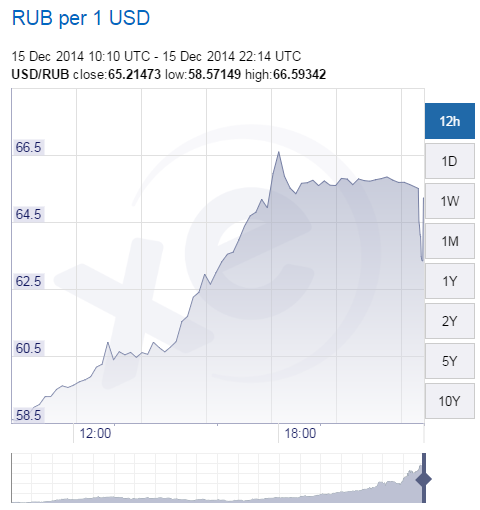
— James Miller
As of 19:52 GMT, just a few minutes ago, XE values the Russian ruble at 65.725 per dollar. At one point, however, the ruble was valued as high as 66.593:
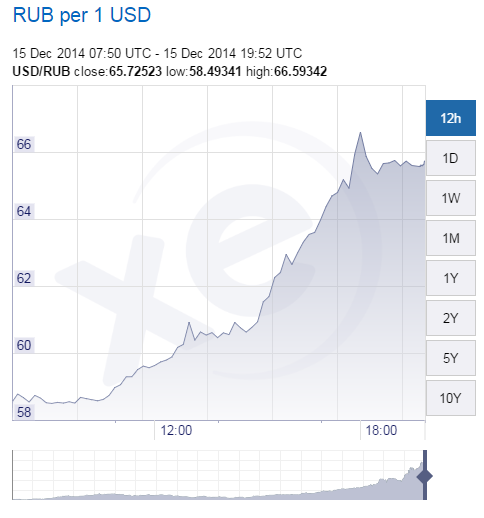
XE also says the current exchange rate is 81.822 per ruble and 102.911 per British Pound.
Questioning continued today, December 15, at the trial of opposition leader Alexey Navalny and his brother Oleg, Novaya Gazeta reported in a liveblog.
The brothers are charged with “embezzlement” in a mail-order business dealing with the French company Yves Rocher East. Despite the fact that the Yves Rocher executives do not have any claim against the Navalnys, and withdrew the claim of a former executive evidently made under pressure, the trial has continued.
 Navalny in a cage in the courtroom. Photo by Novaya Gazeta.
Navalny in a cage in the courtroom. Photo by Novaya Gazeta.
At the trial, Navalny said (translation by The Interpreter):
“Yet another purpose of this lawsuit is to freeze my assets in major
companies, there weren’t much of them, but as a minority shareholder, I
could sue Gazprom, Transneft and others.” Navalny also characterized his
brother as “excellent” and thanked him for “holding up cheerfully”
despite the pressure.
Asked how he would characterize his brother, Oleg said “Excellent, soon he will expose all of you.”
Both the brothers treated the proceedings with humor, as they and their supporters believe the charges, like other pending criminal cases, are in retaliation for Navalny’s opposition activity.
At one point Alexey said to his brother: “Tell them about my criminal role.” Oleg replied that Navalny didn’t understand anything about logistics so he didn’t turn to him.
Oleg said that in November 2012, he mailed 106,000 packages. “And I am confident that I would be delivering them to this day, and everyone would be happy, and everyone would profit. But then the gebisty [KGB agents] came,” said Oleg, using the historic name for the Russian intelligence services.
The court asked Navalny what other sources of income he had, in particular from his Anti-Corruption Fund, his press secretary Kira Yarmysh wrote on Twitter.
Navalny replied: “The Anti-Corruption Fund is the source not of my income but my expense. And it’s an expense I am proud of.”
Translation: AN: how can I be more respectful to these crooks?! Bastrykin there even has a residence in Czech Republic.
Summarizing all of Yarmysh’s tweets, Slon.ru reported that Navalny was warned of charges for “offending court
officials” when he said began speaking frankly about the people who brought him to trial:
“If they are crooks, swindlers and fraudsters, how I can I treat them? If Bastrykin is a Czech spy and the Investigative Committee is an organized crime group?”
Translation: The court pleadings and last word will be on December 19 at 11:00 a.m.
In the Russian court system, the defendant is given an opportunity to make a final speech.
Translation: Alexey says that he has given so many final speeches this year that he has nothing left to say.
Navalny remains under house arrest.
— Catherine A. Fitzpatrick
With the ruble rate in free fall, the Central Bank has cancelled a ruble loan auction today, according to a press release from the Bank of Russia: (translation by The Interpreter):
The Central Bank of the Russian Federation held a Lombard loan auction on December 15, 2014 to offer loans at the floating interest rate under the following conditions:
The period for the cash offer is 36 months (the date of the offer of the loan from the Bank of Russia will be December 16, 2014 and the date for payment will be December 13, 2017). The auction will be a Dutch auction. The maximum volume of cash to be offered is 700 billion rubles [$10.9 billion].
The Lombard credit auction at the floating interest rate providing cash for a period of 36 months has been declared invalid due to the absence of applications.
Translation: The Central Bank has cancelled the auction. The banks didn’t managed to submit notices? Rosneft jumped ahead? Or they thought up a new scheme?
Article 317 of the Civil Code and Article 10 of the law on protection of consumers stipulate that all prices on the territory of Russia must be shown in rubles (translation by The Interpreter), warned Nemeryuk:
All prices on the territory of the Russian Federation are to be shown exclusively in rubles, and not in any equivalents. Moreover, there are sanctions in the form of fines: for individual business people this is from 3,000 to 5,000 rubles, and for legal persons up to 50,000 rubles for violation of this statute.
He added that only a few instances of violation of the law have been recorded in Moscow, and these concerned manufactured goods such as electronic gadgets and building materials.
He urged consumers to report merchants’ usage of other prices to his department at the mayor’s office, to Rospotrebnazdor, the government consumer agency or to the police — and to submit photographs of the prices along with the complaint. He said Moscow authorities conduct daily monitoring of prices and keep a watch over prices in the markets.
The Chinese car dealer JAC, popular in Russia, has begun to post the price of its cars in u.e. on its Russian-language website and indicated that this is pegged to the rate of the dollar at the Central Bank.
 — Catherine A. Fitzpatrick
— Catherine A. Fitzpatrick
It is hard to overstate the decline of the ruble. Literally by the time we are finished writing each update, our data is old.
A major benchmark — the ruble is now worth less than a British penny, as it has fallen to less than 1 ruble per British pound:
As of the last update from Bloomberg, 11:59:59 ET (about 15 minutes ago) the ruble was trading at 64.24 to one US dollar, a loss of 10.22% today:
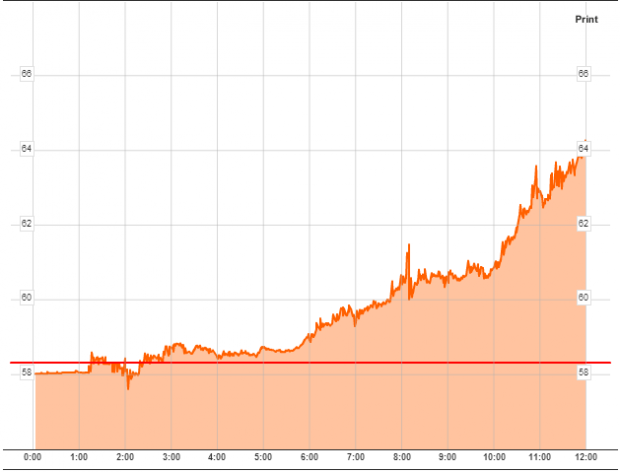
As of that same time, the ruble is trading at 80.09 to one Euro, a loss of 10.09%.
— James Miller
Opposition leader Boris Nemtsov, former first deputy prime minister in the Yeltsin administration, says the reason the ruble is falling is because Igor Sechin, head of Rosneft, a close associate of President Vladimir Putin, is buying up foreign currency with large ruble loans.
Sechin is under Western sanctions for the Kremlin’s war on Ukraine
In a statement on his Facebook page, Nemtsov says (translation by The Interpreter):
Today’s collapse of the ruble is unique that it is occurring against the backdrop of a stable price for oil. Brent crude was traded at $62, but the ruble fell to 61 per dollar during that time.
The reason for this exotic behavior of the ₽ [ruble] is that the Central Bank has turned on the printing press and began to hand out ruble loans.
Sechin’s Rosneft received 626 billion rubles [US $10.3 billion] and went with it to the foreign currency market. Rosneft is supposed to return $14 billion in the coming weeks. You can’t deceive the market. The ruble started to fall.
Today the Central Bank in horror gave someone $5 billion for a year at 1%, afraid to give rubles.
All together, in December, the Central Bank has thrown away $12 billion, but nothing is helping the ruble…
December is a difficult month for Russian companies. They have to pay Western banks more than $30 billion.
They can pay them out of their own reserves, or through emission. Either one will lead to devaluation.
(It has reached already 90% in a year!!!)
Conclusion: the ruble will weaken even further.
And further. My formula currency rate=3260/price of oil no longer works. This formula doesn’t take into account the printing press which has been turned on full blast.
Watch the Central Bank site cbr.ru. This is the country’s main site, cooler than Yandex.
Sergei Aleksashenko, a leading Russian economist, former deputy governor of the Central Bank, and former deputy finance minister under Yeltsin, has been commenting on Twitter:
Translation: it looks like today Rosneft came to the foreign currency market with all of its hundreds of billions of honestly earned rubles…
Translation: The Central Bank has given someone nearly $5 billion for a year at 1% annual interest. I wonder 1) to whom? 2) will this reflection on the data on the reserves?
Translation: 50% devaluation of the ruble in three months? Ah, yes, Nabiulluna! Oh, good going!
Elvira Nabiullina is the head of the Central Bank and former economic advisor between May 2012 to June 2013 after serving as minister of economic development and trade from September 2007 to May 2012.
The Russian stock market has reacted:
Translation: Gazprom (-10.5%) Rosneft (-11.2%).
— Catherine A. Fitzpatrick
Free fall — the ruble started today’s trading at approximately 58 rubles to one US Dollar. Right now it is at 63.1 to a dollar, a drop of %8.27:
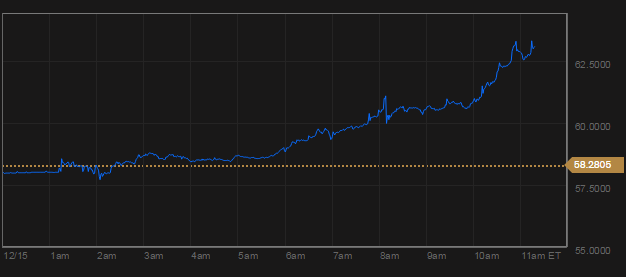
The ruble is doing even worse against the Euro, and is now trading at 78.82, a fall of 8.35% in a single day. The single-day graph of the euro is similar to the one above, so this chart shows the entire year. On January 1, 2014, the ruble was trading at 45.65 to a Euro. The ruble has dropped 42% since then. As the chart shows, though, most of that decline is in the last three months, so it’s not Western sanctions that are driving the ruble down:
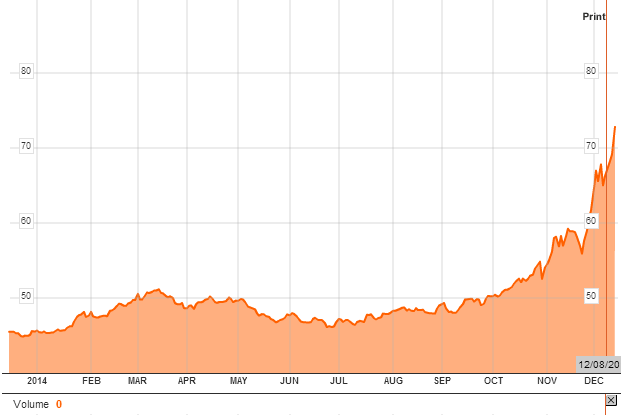
But it’s not just the dropping price of oil that is the problem either. WTI Crude oil is only down 1.64% today ($56.86 per barrel), and Brent crude is only down .37% ($61.62 per barrel). In fact, The Wall Street Journal reports that the price of oil was actually up earlier due to the security situation in Libya:
But despite the closure of two Libyan oil ports and oil production from that country, the markets barely blinked:
“Although the price was lent some buoyancy this morning by news of the closure of two Libyan oil terminals, the underlying mood remains negative,” said Commerzbank in a note Monday.
The unrest in Libya is likely to widen the price difference between Brent and the U.S. benchmark, said Jim Ritterbusch , president of energy-advisory firm Ritterbusch & Associates. Brent crude competes directly with Libyan crude, while U.S. oil cannot be exported and is thus less sensitive to supply outages in other regions.
The head of the Organization of the Petroleum Exporting Countries, Abdalla Salem el-Badri, said Sunday that the oil cartel hasn’t set a target for the oil price and appeared to imply the organization would tolerate much lower prices.
None of this bodes well for Russia.
In the time it took to write this update, the ruble has fallen to 63.67 to a dollar, a drop of 9.24%.
— James Miller
The ruble slid further today to 58.71 to the dollar, slon.ru reported, and to 73 to the euro at 10:55 Moscow time.
The culprit is the price of oil, which has dropped to $62 for Brent crude, Reuters reported.
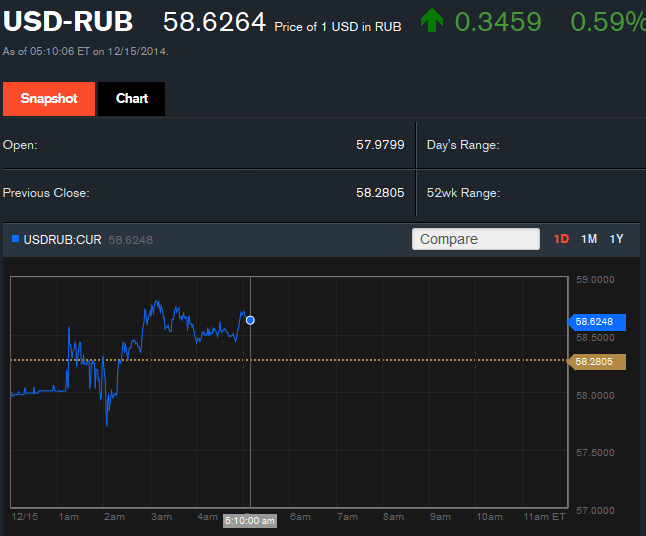
Moscow has been cutting its budget and propping up the ruble, but it hasn’t helped.
Russian merchants have started using the abbreviation “u.e.” for uslovnaya edinitsa or “conventional unit”.
Translation: Oh, yeah! U.e. returns.
The report of the re-appearance of the u.e. seems to be confirmed only in one store so far, although on Twitter, a lot of Russians are asking what the term means. The radio station Govorit Moskva says their correspondent found the price in a construction materials store in Khimki, a suburb of Moscow.
When asked why they had indicated the price in this
fashion, the store clerks said they found it easier, as otherwise they
would have to change their prices several times a week.
Translation: According to the rate of the Central Bank of the Russian Federation on the day of payment. Internet stores have already begun to put prices in u.e.
The tweet links to a site selling rugs, kovrik.ru, which has started to price their wares in euros.
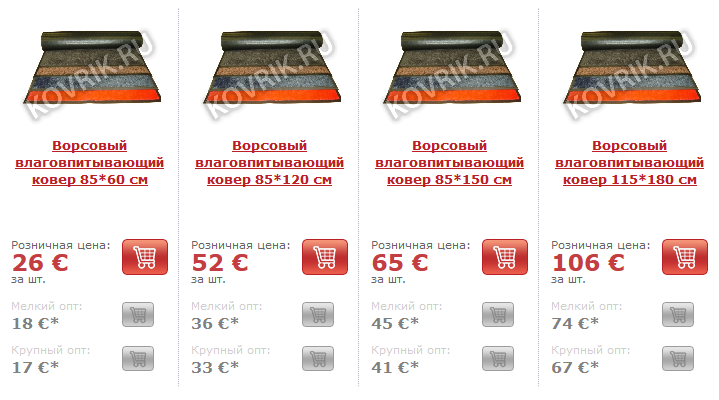
Translation: Hello, conventional unit! I knew that you would return. Let’s have like the old 1990s?
Translation: News Price tags with “u.e.” (conventional unit) have appeared in a store selling ceramic tiles.
Car dealers have also started to put prices in u.e., reports Avtosreda.ru although we are seeing sites with the prices still in rubles.
Under Russian law, it is prohibited to put prices in currencies other than the ruble.
The government newspaper Rossiyskaya Gazeta (RG) has refuted the rumors (translation by The Interpreter):
“Rumors about the transition to conventional units have really appeared. And a number of Internet stores are thinking or moving to the u.e. or intend to change the prices several times a day,” Ivan Kurguzov, head of the electronic commercial cluster for the Russian Association of Electronic Commerce to RG.
But for now, according to him, this is more in the realm of rumors. “There are stores with various ethical codes,” the expert continued. “And new deliveries of goods in fact have risen in price, and transportation services have grown more expensive. And online trade is experiencing difficulties like all business.”
Moskovsky Komsomolets had a story on the conventional units, but then deleted it. The tweet remains:
Translation: will the Black Sea mullet replaced the Norwegian salmon? Prices denominated in u.e. have appeared in the RF.
Translation: I remember the advertising banner from Perm in 2009: “We will return the ruble to its former fame/we will throw the u.e. down the drain.”
— Catherine A. Fitzpatrick